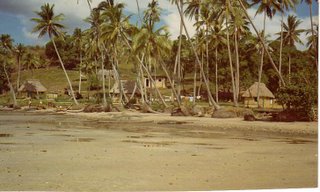
From Peceli
Nukutatava means the place to roast or barbecue fish or meat. This beach property probably goes back to the days of beche-de-mer trading when mainly American sailing ships used the coast of Macuata in the early 1800s to collect the sea cucumbers to sell in China. Nukutatava was probably one of the places where there were smoking sheds.
The chief at that time was Ritova and stories about him are told in books such as the narrative by Mrs Wallis, the wife of a trader, or the story of Cannibal Jack.
It seems that this area was later used for planting cotton and managed by a European who bought the land I have been told - for a gun and rum! There is a grave on top of the hill, marked with the name of Joy but I have not found out their story.
In recent years this land was leased to an Indian cane-farmer and by 1972 the lease ran out and I was able to claim the land back for our tribe. That was not easy as I had to prove I was poorer than the Indian. I was - I took three years leave from the Methodist Church and moved to Labasa.
I went to numerous Land Tribunals on behalf of our family and we won time after time but our opposition found new grounds for argument. The final court sitting was in Lautoka and at last we won our land back.
Let me describe my first visit to this beach property. We drove down as far as the road went then walked over hills amidst sugarcane farms until we came to the beach, a curved strip of white sand, and grassland sloping up a hillside with several mango and coconut trees. There were no houses at all.
Two fallen coconut tree trunks lay in the clear water and on one of them were two dakudakulaci - striped seasnakes, the Mali Island totem, sunning themselves. It was such a quiet, peaceful place. e explored along the beach and found a natural spring coming out of a cliff, feeding clean water into a pool. There were signs of some Indian ritual there because we saw some garlands and broken coconut shells.
As we looked at the land, now reclaimed as ours by the Land Tribunal Court, I felt very happy and saw the possibilities of the place for picnics for the local people, some houses for our families of for tourists and a boat tied up to take people to Vorovoro Island or Mali. Then we saw a huge rainbow over the hillside and that confirmed our happiness.
We did build three bamboo huts, for backpacker tourists but were rather naïve and only charged about $4 a day to them! Then we moved in and our family lived there for a time.

1 comment:
I know I'm responding to an old post, but I'm hoping this site is still operating. I can fill you in on the Joy's you mention, and I would love to find out more about the location. I am a descendant of Louisa and Manuel Joy.
Dixie
Post a Comment